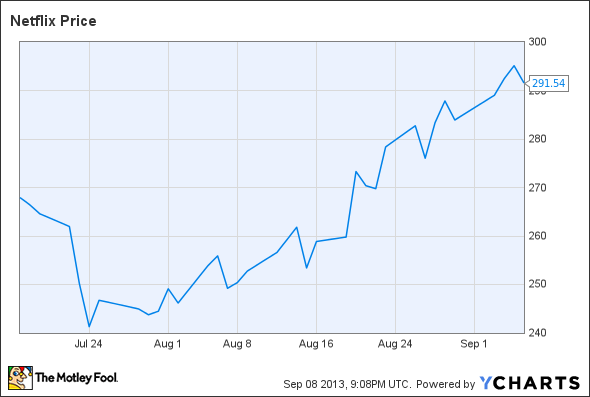Back in July, Netflix (NFLX +1.67%) released a decidedly mixed earnings report. While EPS came in ahead of expectations, many investors were expecting faster domestic subscriber growth than the 630,000 net additions Netflix reported. Investors, who had driven Netflix stock up from its 52-week low of $53.05 to nearly $270 in the previous 10 months, decided to take a breather.
Netflix Price Chart: 7/17/13-7/24/13, data by YCharts.
This caused significant selling pressure. In fact, as the chart shows, investors were so disappointed that they drove Netflix stock down by around 10% in the week surrounding Netflix's second-quarter earnings report.
Fast-forward to today, and the situation is quite different. Not only has Netflix regained all the ground that it lost after its earnings report, the stock has also surged 10% beyond that level. Last week, Netflix stock flirted with the $300 level, reaching a high of $298.93 -- just below its all-time high of approximately $305.
Netflix Price Chart: 7/17/13-present, data by YCharts.
What's going on here? Was the initial reaction to Netflix's earnings report wrong? Or has the subsequent run-up been unjustified?
Mixed earnings
Netflix's second-quarter earnings report was by no means "bad." The company added 630,000 domestic subscribers (net of cancellations), better than the 530,000 net adds it reported for second-quarter 2012. EPS hit $0.49, the best result achieved since Netflix's meltdown in late 2011. On the flip side, for the first time, Netflix's management team mentioned "saturation" of the domestic market as a risk in the quarterly investor letter.
Looking at the earnings report in isolation, even these words of caution could not justify a significant drop in the stock price. Domestic and international membership growth continued at a steady clip, net income grew dramatically, and the company even generated positive free cash flow -- albeit a modest amount.
Netflix 1 Year Price Chart, data by YCharts.
Zoom out, though, and it's hard to fault people for selling Netflix at $270. The stock had quintupled in less than a year! Even if Netflix was undervalued in 2012, it's hard to find a basis for the stock's massive gains since then in the company's financial improvement over that time. Revenue is growing at a 20% clip and margins are expanding, but many other companies with lower valuations are growing revenue and/or margins faster than Netflix.
To look at it from another perspective, Netflix earned EPS of $3.94 in the 12 months ending on June 30, 2011 -- prior to the failed price increase/Qwikster spinoff. That was also the last time that Netflix shares traded for $300. By contrast, Netflix earned adjusted EPS of just $1.06 over the last 12 months. Netflix's earnings and growth rate have both dropped over the last two years, so why is the stock back near its all-time high?
No news is apparently good news
In context, it seems clear that investors had good reason to demand a stellar earnings report from Netflix back in July. When the earnings report was just "good," many investors quite understandably decided to pocket their gains.
Furthermore, there hasn't been much weighty Netflix-related news to justify the stock's recent pop. In the past two weeks, Netflix has announced two new stand-up comedy specials. However, as one-time events, it is unlikely that these specials will move the needle on subscriber growth.
Netflix also announced a new exclusive licensing agreement with The Weinstein Company last month. This could potentially be a significant win for Netflix, given the success of many recent TWC movies. That said, the agreement doesn't go into effect until 2016, and the movies it covers have not even been made yet! (Pricing terms were not disclosed, either.) As a result, this does not seem like market-moving news, either.
Foolish conclusion
Overall, Netflix's after-earnings pullback in late July makes a lot more sense from a fundamental perspective than the subsequent rally. While Netflix is certainly improving its performance every quarter, it would need to grow a lot faster to justify its valuation of nearly 90 times forward earnings.
A stellar valuation multiple requires stellar performance. Moreover, Netflix is years away from "growing into its stock price," even in a bullish scenario. As a result, if Netflix continues to post good -- but not great -- results, the stock is likely to collapse eventually.



